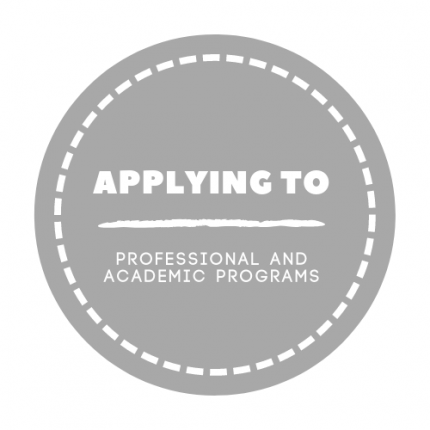Academic Programs
There are generally two types of post-undergraduate schooling: academic programs, where you will earn a Masters’s degree or a Doctorate (PhD) and a professional school where you will learn the skills and gain the credentials that allow you to enter a specific profession (i.e. a law school).
One of the most surprising things students learn when they come to the workshop is that most PhD programs if you can get in, do not end up costing the student money in terms of tuition. And most of the time students actually receive a stipend (monthly money) to help support them while they are working on their degree. This is actually one of the main reasons for the workshop–I think academia would be better off if there were more people from a variety of class backgrounds. By supporting and encouraging more students to apply we can slowly shift academia just a bit. Don’t worry though – I support all our students who want to go to grad school. The more the merrier.
Before any student applies to grad school, I think it is really helpful to interrogate why they want to go. Being afraid or not know what else to do is not a good reason to go to graduate school. There are actually very compelling reasons why most people should not go into an academic program — there are not a lot of jobs available, the pay is not that amazing, and the time costs of going to school put you behind saving for retirement, buying a home, and starting a family. This impacts women more than men and people who come from modest backgrounds more than people whose families can help them buy a home. “Going into academia” requires very careful deliberation. I generally tell people that if there is anything else in the world you would like the same, or more than spending your life working in a university GO DO THAT instead. A PhD is a difficult path, and it does not actually get easier.
Fabio Rojas wrote a book called Grad School Rulz that does an amazing job of laying down an argument against going to grad school. Check out some of the posts in his blog, then buy his book (I think it is 2USD).
Women and people of colour have historically been excluded from academic and professional schooling. Here is a site that has lots of information on the cultural challenges for students from low-SES backgrounds navigating graduate programs.
And the American Sociological Association actually has been doing a series of studies on PhD’s in Sociology to see how they fare. You can read more about their study here.
Still Want to Apply?
Great. Like I said, we are here to support your decision. So, the next topic is WHERE should you apply? Or maybe HOW do you apply? Much of the site and a good part of our in person meetings address both of these questions. But a starting point is to think about where you want to go to school. This is a very complex question and LOTS of factors come into account. For instance, there is a “regionality” to the job market, but at the same time schools are unlikely to hire their own graduates. Some students want to study something that is highly specialized, and thus they need to apply to programs that have experts in a specific subfield, which greatly narrows the number of schools they can choose from. Other students really want to live in say, the UK, and so they will have a preference for schools there.
Over the past few years I have noticed that lots of students let an exam determine where they apply. The U.S. has a lot of very strong PhD and Master programs (more on the difference in a bit), BUT they almost all require students to take the Graduate Record Exam or GRE. This exam is difficult to excel on and is expensive. Many Canadian schools are also beginning to require it as well. It takes a lot of time and effort to study for the GRE so if you are going to take it, start preparing at once. Many students take it two times in an attempt to improve their score.
Regardless of your constraints and preferences, overall my rule of thumb is that students should go to the highest-ranked school that provides full funding. This article from the American Sociological Review makes the case that this will improve your prospect, which, if you did your homework, is THAT guaranteed.
MA/MS Vs PhD Programs
Master programs range from one-year intensive programs (UofT, Columbia, Chicago all offer these in Sociology) that cost quite a bit of money and offer course work and thesis writing support, but limited contact with faculty and little to no funding, to programs that are integrated with PhD programs and are designed for students who will most likely progress to a PhD. There is mixed evidence that a MA in Sociology in and of itself will bring large economic advantages. Historically people only received an MA as part of the PhD program, but these new programs are changing this. I don’t know of any evidence that points to one-year programs being super valued in the labour market, but they are fairly new. My guess is that they help students land jobs since they signal to employers that someone is motivated.
The MA programs that I am most familiar with are part of a PhD program and are what students do during the first 2-3 years of grad school. Typically they involve coursework and a thesis project, which is a smaller version of the dissertation and demonstrates your ability to conduct an independent research project. Once defended, students are typically admitted into the PhD program.
PhD programs take anywhere between 4 and 8 years (although 10 years is not all that uncommon). During this time you finish up your coursework, take a comprehensive exam (demonstrating competence in 2-3 subfields), defend your dissertation proposal, and then complete your dissertation. Did you know that there is a status called “ABD” for graduate students? This stands for All But Dissertation and it is a common end point for students. They get to this last hurdle and struggle to finish. PhD programs take a long time and a lot of effort. There is really nothing wrong with deciding at some point that it is not what you want to do. But again, be cautious and read about the process of getting a PhD, talk to current students, and really think about whether this is the right path for you! Even if you don’t finish your PhD you will still have a Masters degree.
Getting Started
To get started, make a list of about ten schools that you are interested in and start researching them — which sociologists or other experts are working on which problems at which university? You want to really focus on people doing the kind of work that you aspire to do. Read their papers, look at the papers that their students have written (look for co-authors and then go look at their CV’s). You really want to Sherlock Holmes this as much as possible. Make lists of people and of universities, and then start looking at what is required to apply. This process takes weeks. Once you have a few schools, look at the CVs of faculty you know, or of faculty in your department and go ask them about their training. Email graduate students at the schools you are interested in and ask them about their training. You want to learn as much as possible at this point.

